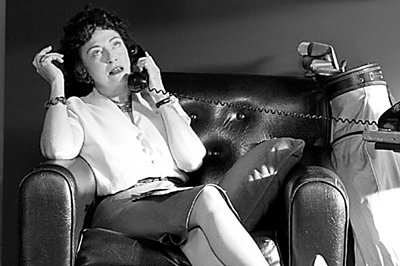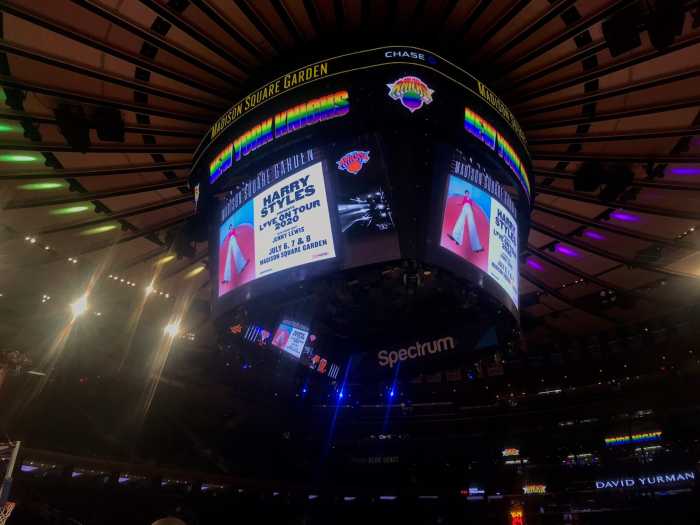Richard Day fails to follow up on promise of ‘Girls Will Be Girls’
“Straight-Jacket” tries to milk humor and social commentary from the premise of having a vain, promiscuous gay actor in 1950s Hollywood fall in love with the man of his dreams while posing as straight to save his career.
The irony is deliberate, but what should be a clever and amusing film about sexuality and the evils of conformity is, in fact, a didactic lesson about morality and being true to one’s self. Written and directed by Richard Day, who also penned the play upon which the film is based, “Straight-Jacket” is a good idea sabotaged by lame jokes, poor pacing and labored performances.
Guy Stone (Matt Letscher) is a hunk who loves men for one night, if that long, but himself most of all. His fast-talking agent Jerry (Veronica Cartwright) always finds a silver lining in whatever mess Guy finds himself in, but she is seriously challenged when rival actor Freddie (Jack Plotnick) photographs Guy stepping out of a gay bar.
To quell the press and quash the rumor mill—as well as to keep his contract—Guy agrees to marry Sally (Carrie Preston), the lovestruck secretary to SRO studio mogul Saul (Victor Raider-Wexler). The catch is that Sally is not aware that Guy is gay.
When “Straight-Jacket” attempts to have fun at Guy’s expense—chronicling his horrified reactions to Sally’s bad decorating schemes, worse cooking and determined efforts to make love to him—hilarity does not ensue. The film is played so broadly that the only real laughs are generated by Guy’s trusted queer valet (Michael Emerson), who frequently cracks wise.
There is some dramatic relief when Rick (Adam Greer) shows up as a novelist rewriting the script for Guy’s latest film. Guy is instantly smitten with the screenwriter, but Rick is conflicted both about bedding the star and about “selling out” to Hollywood. While Rick’s earnestness is refreshing, it is hard to believe the men’s romance because of the lack of apparent chemistry between these attractive opposites.
“Straight-Jacket” uses the romance to range widely to tackle big issues from gay bashing to the practice of naming names in the McCarthy era. Such plot devices reinforce the underlying moral that people should be free to be who and what they are. But like Guy’s career if he were outed, the effort all goes down in flames.
Part of the problem is that Day creates a series of throwaway gags that never build to anything substantial. Much of the humor is dead on arrival, and if not, it is quickly beaten to death. A repetitive joke about a Jerry being a lesbian tires long before the payoff, and the film’s various efforts at physical humor are slapstuck.
The main characters remain one-dimensional cardboard cut-outs. It is difficult to care about them and their dilemmas, which become increasingly far-fetched without ever being funny. A party scene in which Sally learns the truth about her husband’s homosexuality is particularly forced. Throughout, the effort feels artificial. It is supposed to be campy, but it never gets beyond a sense of being elaborately staged.
“Straight-Jacket” is particularly disappointing because Day’s previous effort, “Girls Will Be Girls,” although flawed, showed some real comic promise.
Two of the stars from “Girls”—Jack Plotnick, and Clinton Leupp (a.k.a. Ms. Coco Peru)—appear in this film, but their talents are wasted here. Veronica Cartwright is actually terrific as Jerry, but it is damning with faint praise to say she is the best thing in this film.
The leads, all newcomers, lack charisma. Matt Letscher flails and fails at the nearly impossible task of making his unlikable character sympathetic, and his co-star, Carrie Preston is incredibly shrill throughout the film. These actors deserve better than this silly material which consists mainly of dumb double entendres. Adam Greer does his best as Rick, but he too overplays an underwritten role.
“Straight-Jacket” ultimately backs itself into a corner by trying to address too many important issues simultaneously, but hitting none of them well.


































